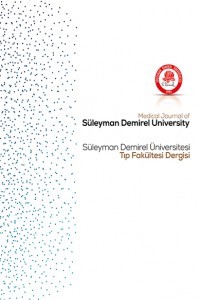Süleyman Demirel Üniversitesi Tıp Fakültesi Kadın Hastalıkları ve Doğum Kliniği'ndeki Dört Yıllık Genetik Amniyosentez Sonuçlarının Retrospektif Bir Analizi
Amniyosentez, prenatal taný
___
- Apak MA. Genetik hastalýklara yaklaþým ve genetik danýþma Prenatal taný ve tedavi Editör: K. Aydýnlý. Ýstanbul Perspektiv, 1992;1-18.
- Tabor A. Amniocentesis Kurjak A. (ed): Textbook of perinatal medicine. New York, USA Parthenon Publishing, 1998;1047-55.
- Ferguson-Smith MA. Prenatal chromosome analysis and its impact on the incidence. BMC 39, 1983: 355- 57.
- Boure A, Gallano PA. Collaborative study of the serration of inherited chromosome structural rearrangements in 1356 prenatal diagnosis. Pre Diag (special diag), 1994 (4): 45-51.
- Milunsky A. The use of biochemical markers in maternal serum screening for chromosome defects. Genetic disorders and the fetus Editor A. Milunsky. The Johns Hopkins University Press, Baltimore and London, 1992.
- Marthin T, Liedgren S, Hammar M. Transplacental needle passage and other risk factors associated with second trimester amniocentesis. Acta Obstet Gynecol Scand, 1997; (76): 728-32.
- Tongsong T, Wanapirak C, Sirivatanapa P. Amniocentesis-related fetal loss; a cohort study. Obstet Gynecol, 1998; (92): 64-7.
- Apak M, Baþaran S, Aydýnlý K, Kayserili H, Karaman B, Polat D, et al. Genetik hastalýklarýn prenatal tanýsý: I.U. Pretamdaki üç yýllýk uygulama ve araþtýrmanýn sonuçlarý. Ýstanbul Týp Fak. Mecm, 1999: 62- 4.
- Halliday J. Karyotype abnormalities in fetuses diagnosed as abnormal on US before 20 weeks gestational age. Pre Diag, 1994; (14): 689-92.
- Rizzo N. Prenatal karyotping in malformed fetuses. Pre Diag, 1990; (10):17-9.
- Sjögren B. Prenatal diagnosis for psychological reasons: Comparison with other indications, advanced maternal age and known genetic risk. Pre Diag, 1990; (10): 11- 2.
- Tabor A, Philip J, Madsen M. Randomised controlled trial of genetic amniocentesis in 4606 low-risk women. Lancet 1986; (327): 1287-93.
- Brumfield CG, Lins, Conner W. Pregnancy outcome following genetic amniocentesis at 11-14 versus 16- 19 weeks gestation. Obstet Gynecol, 1996; (88): 114- 18.
- The Canadian Early and Mid-trimester Amniocentesis Trial (CEMAT) Group. Randomised trial to assess safety and fetal outcome of early and midtrimester amniocentesis. Lancet 1998; (351): 242-47.
- Milunsky A. Prenatal diagnosis of genetic disorders. Am J Med, 1981; (3): 70-7.
- Tabor A, Jerne D, Bock JE. Incidence of rhesus immunisation after genetic amniocentesis. Br. Med J 1987; (293): 533-36.
- ISSN: 1300-7416
- Yayın Aralığı: Yılda 4 Sayı
- Başlangıç: 2015
- Yayıncı: Süleyman Demirel Üniversitesi
Isparta bölgesinde mide kanserli hastalarda helikobakter pilori sıklığı
Nermin Karahan, Sema Bircan, Nilgün Kapucuoğlu, Şirin Başpınar, Özden Çandır, Ersin USKUN
Genel cerrahi dersinde görsel-işitsel araçların kullanılmasında öğrenci tercihleri
Ömer TARHAN, İbrahim BARUT, Celal ÇERÇİ, Sibel YEŞİLDAL, Erol EROĞLU, Mahmut BÜLBÜL
İndol-3-asetik asit'in üçüncü nesil farelerin kemik iliği hücrelerinde mitotik indeks üzerine etkisi
H.Ramazan Yılmaz, Eşref Yüksel
Solunum sıkıntısı sebebi olarak tiroid papiller karsinomu
Giray Aynalı, Hasan Yasan, Mustafa Tüz, Metin Ciriş, Orhan Oyar
Bilateral korpus hemorajikum kist rüptürüne bağlı Akut Batın : Olgu Sunumu
Hasan Şahiner, Okan Özkaya, Mekin Sezik, Nermin Karahan, Hakan Kaya
Torakotomi sonrası devamlı intraplevral ve ekstraplevral analjezi
Fetal büyümeye etki eden çevresel faktörler
Fetal dönemde üst ve alt ekstremite arasındaki büyüme oranları
Mehmet MALAS, Şevkinaz DOĞAN, E.hilal EVCİL, Kadir DESDİCİOĞLU, S.murat TAĞIL, Osman SULAK, Esra ÇETİN
